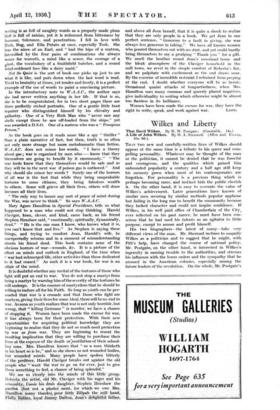Wilkes and Liberty
That Devil Wilkes. By R. W. Postgate. (Constable, 14a.)
A Life of John Wilkes. By 0. A. Sherrard. (Allen and Unwin.
- 10s. 13d.).
THAT two new and carefully-written. lives of Wilkes should appear at the same time is a tribute to his queer and com- pelling personality. Whatever may be thought of the man or the politician; it cannot be denied that he was forceful and courageous, and the qualities which gained him unbounded pcipularity a century and a half ago still keep his memory green when most of his contemporaries are forgotten. For personality is a precious thing which is perhaps becoming rarer, and instinct bids the public cherish it. On the other hand, it is easy to overrate the value of Wilkes's achievement. Later generations have known of similar men securing by similar methods popular applause but failing in the long run to benefit the community because they lacked character and could not inspire confidence. If Wilkes, in his well paid office of Chamberlain of the City, ever reflected on his past career, he must have been con- scious that he had used his talents as an agitator to little purpose, except to amuse and profit himself.
His two biographers—the latest of many—take very different views of the man. Mr. Sherrard inclines to magnify -Wilkes as a politician and to suggest that he might, with Pitt's help, have changed the course of national policy. Mr. Postgate, on the other hand, is interested in NVilkeh's ingenuity in causing trouble to the authorities; and stresses his influence with the lower orders and the sympathy that he aroused in the American colonies, especially among the future leaders of the revolution. On the whole, Mr. Postgate's is the safer estimate. If we remember how difficult it was for Burke, with his immense political ability and his high character, to attain even minor office, we may very well doubt whether Wilkes, with his flashy talent, and his notorious reputation, could have secured the humblest part in a Ministry under George HI. It is possibly true that he was no worse a man than Sandwich or other noble associates of his in the Med- menham revels who afterwards turned against him. But they had rank and wealth and he had not, so that in attacking the Court and its supporters he was fatally handicapped. Mr. Postgate declares that the indecent parody of Pope for which he was expelled from the House of Commons in 1763 was in fact written by Potter, son of an Archbishop, and that Wilkes only added the notes which were mischievously attributed to the learned Warburton. All that this proves, however, is that Wilkes was not singular in his very dubious tastes. it is edifying to learn, on the authority of Cowper's friend, John Newton, that the pious folk of Olney in 1770, " in their prayers at home were much engaged for the welfare " of the scapegrace ; they had heard, wrote Newton, that he was in prison, and assumed that he must be a minister of the Gospel, suffering, like St. Peter, for his faith...
Wilkes, as his biographers show, was in his true element in the City where he was born, the son of a rich distiller, and where he spent his most useful years. He knew the London merchants and the London mob, and, as Mr. Postgate acutely observes, he dominated them both until, in the Gordon riots of 1780, he had to choose between them. Wilkes, by his courage and his slight experience of military service in the Bucks Militia, checked the rioters and saved the Bank of England from pillage, but his stand for law and order lost him thenceforth the favour of the populace. As an alderman, he showed himself expert in the civic game of intrigue. As Lord Mayor be entertained royally and introduced some useful .reforms in administration. As City Chamberlain he was respectably efficient and, gaining the favour of the King who once referred to him as " that devil Wilkes," could assure His Majesty that he had never been " a Wilkite." Outside the City Wilkes had the luck to be persecuted first by a very stupid Secretary of State, who had him arrested on a General Warrant which Chief Justice Pratt took a delight in declaring illegal though the best opinion of the day differed from Pratt's. Next he had the still greater luck to involve an unrepresentative House of Commons in a quarrel with the freeholders of Middlesex, for the counties were all jealous of their privileges, and Middlesex included many voters resident in the City. Wilkes was adroit enough to use these opportunities for publicity to the full, and thus his name is enshrined in every constitutional text-book. But, when all is said, there is little to show that he had any coherent ideas of reform. " Wilkes and Liberty " was a " slogan," in the current phraseology, which served his purpose well enough but which he was careful not to define too closely.



























































 Previous page
Previous page